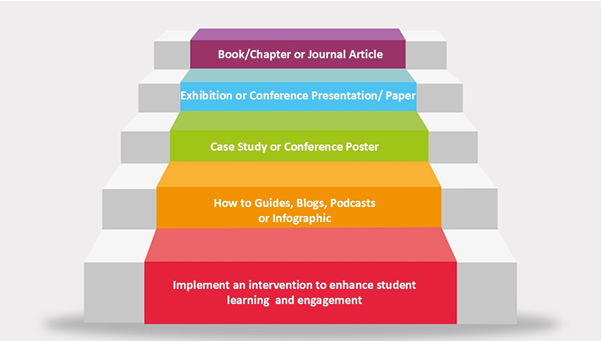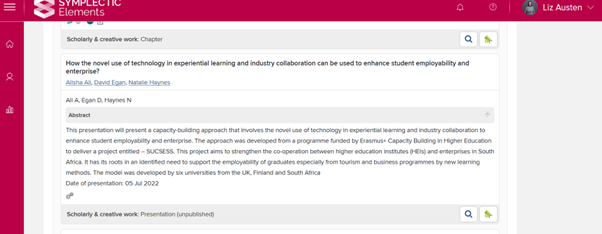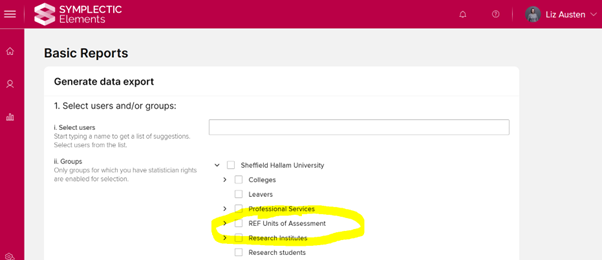Introduction
Recording and sharing our own outputs at any level of the SoTL Staircase (Beckingham, 2023) is an important aspect of our professional work. This could be a conference paper, exhibition, case, study, blog, journal article or other academic output that we have done individually or with others. This blog outlines how you can do this using Elements and provides a resource and SoTL guide for how to record your own work and search for that of our talented Hallam colleagues.
What is Elements?
Elements is a platform for managing and showcasing research and scholarly activities and outputs, storing this information centrally in one place. Recording our outputs is important for keeping a log of our activity but also to enable others to search for our work. Setting up your own profile is helpful for your own personal record (including any supervisions you do or have completed) and building your professional identity. Elements records can help academic progression as they can be used to develop for example, narrative CVs. Having a list of outputs from Elements is also a requirement of professorial applications. The ‘publication’ lists on staff profiles on the external web pages are populated from publication details in Elements and automatically update with new outputs as you add them. There is library guidance that talks you through how to populate your Elements profile with relevant details about your activity.
Tip! When you create a title and abstract for your work, make sure it is accessible and traceable for colleagues searching for it! It’s tempting to create exciting titles which can sometimes leave the reader with a sense of ambiguity and not able to find what they are looking for, meaning you might miss out on being cited...good keywords are crucial!
Why is it helpful for SoTL?
ALL of the outputs on the SoTL Staircase should be added to your personal Elements profile.

Figure 1: The SoTL Staircase
This means that Elements is populated with a huge amount of information about the research and scholarly outputs of Hallam staff. It is an underused tool for literature searching or connecting with others with similar expertise on similar topics. Elements could also hold vital contextual information for developing a future SoTL project proposal.
How can I use it?
To find the work of Hallam staff on Elements using a keyword search go to Menu>Reporting>System Search. Using the filter options, an advanced search of 10 years for ‘teaching’ and selecting only ‘Scholarly and creative works’ returns 754 accessible outputs from our colleagues. Filtering for outputs from 2020 returns 368 outputs. Unfortunately, the advanced keyword search does not export the search list as a whole out of Elements.
A more focused keyword such as “experiential learning” returns 10 outputs since 2020 and would suggest that these authors would be good people to connect with if you were designing a SoTL project exploring this pedagogic approach.
Ali, A., Egan, D., & Haynes, N. (2022). How the novel use of technology in experiential learning and industry collaboration can be used to enhance student employability and enterprise? Presented at: Teaching and Learning Conference 2022: Teaching in the Spotlight, Northumbria University, 2022

Figure 2: Example output from an Elements keyword search
An alternative search, which does produce an Excel spreadsheet of results, is possible by using the Reporting>Reports & Dashboards>Basic Reports function. All outputs from the REF Unit of Assessment 23 (Education), which is most aligned to SoTL outputs, can be accessed in this way.

Figure 3: Reporting function in Elements
Conclusion
Many readers may have used Elements before as active researchers writing R&I plans or depositing outputs. Some of you may be new to understanding it’s role and function. Whichever scenario is true, we ask you to consider how Elements can support your personal SoTL impact, connections to existing expertise at Hallam, and generate ideas for your next SoTL project.
SoTL projects are available to everyone interested in improving their LTA approaches and sharing those results with others. Hallam colleagues can now apply for funding to support their project work. More details can be found on the College SharePoint sites. Project proposals can be made using this online form https://forms.office.com/e/aNwFMkifus
Author Details
Anne Kellock, Associate Head, Sheffield Institute of Education, College of Social Sciences and Arts, SoTL College Co-Lead a.kellock@shu.ac.uk (7) Kellock, Anne | LinkedIn
Liz Austen, Associate Dean Learning, Teaching and Student Success, College of Social Sciences and Arts, l.austen@shu.ac.uk


